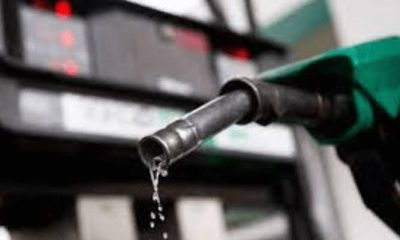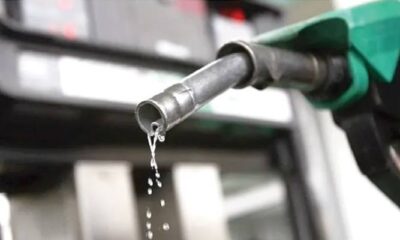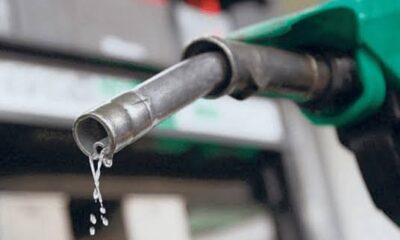Economy
Why Fuel Price May Crash To N500 Per Litre In 2025 – Marketers

Strong indications have emerged that the price of Premium Motor Spirit (PMS), popularly known as petrol, could drop as low as N500 per litre in 2025.
This projection, which has sparked widespread interest, is anchored on key developments within Nigeria’s downstream petroleum sector.
According to Saturday Sun, Industry experts have attributed the potential price reduction to several factors, including the Federal Government’s deregulation policy, a stable foreign exchange system, increased local refining capacity, and the implementation of the naira-for-crude policy.
Speaking on the issue, the Publicity Secretary of the Independent Petroleum Marketers Association of Nigeria (IPMAN), Mr. Ukadike Chinedu, said the reopening of the Warri and Port Harcourt refineries is a game-changer.
According to him, these refineries, alongside the Dangote Refinery, have created healthy competition in the downstream sector, ultimately benefiting consumers.
Chinedu highlighted that both NNPC Limited and Dangote Refinery have already reduced ex-depot prices in recent weeks, signaling the early benefits of multiple production sources.
“With the new refineries coming on stream, the days of monopoly are over. By 2025, we are confident that petrol prices will drop below N500 per litre,” he noted.
Also speaking, the President of the Petroleum Products Retail Outlets Owners Association of Nigeria (PETROAN), Mr. Billy Harry, echoed similar sentiments.
He emphasized that consistent supply from the newly rehabilitated Port Harcourt and Warri refineries would drive prices down significantly.
“NNPC has reduced its ex-depot price from N1,045 to N899 per litre, and Dangote Refinery has followed suit. These reductions are paving the way for more affordable fuel in the coming year,” he explained.
Another critical factor driving the optimism is the Federal Government’s naira-for-crude policy, which allows local refineries to purchase crude oil in naira instead of dollars. This policy, experts believe, will reduce foreign exchange pressure, stabilize the naira, and make petrol production more cost-effective.
In addition to the traditional refineries, modular refineries are also set to play a significant role. With more modular operators planning to expand their production to include petrol, the country’s local refining capacity is expected to increase. Currently, modular refineries produce only diesel, but industry players have expressed confidence that this will change in the coming months.
Data from the Nigerian Midstream and Downstream Petroleum Regulatory Authority (NMDPRA) shows that Nigeria’s daily petrol consumption stands at about 40 million litres. Of this, local production currently meets only 20.5% of the demand, with the remaining 79.5% being imported.
However, experts believe that as local refineries ramp up production, the dependence on imports will reduce, leading to significant price drops.
The Publicity Secretary of the Crude Oil Refiners Association of Nigeria (CORAN), Mr. Iche Idoko, stated that Nigerians would soon begin to experience the full benefits of deregulation.
“Deregulation naturally leads to price competition. With more refineries coming on stream, we will see a race to attract consumers with better prices and improved product quality,” he said.
As the country continues its journey towards self-sufficiency in petrol production, marketers are optimistic that 2025 will usher in a new era of affordable fuel prices for Nigerians. With a combination of policy reforms, increased local refining, and reduced forex dependence, the future of the downstream petroleum sector looks promising.
-

 Breaking News3 years ago
Breaking News3 years agoBREAKING: CBN Redesigns Naira Notes
-

 Breaking News2 years ago
Breaking News2 years agoBREAKING: Tinubu Considers Temporary Subsidy On Petrol
-

 Breaking News2 years ago
Breaking News2 years agoJUST IN: Gbajabiamila Dies In UK
-

 News3 years ago
News3 years agoDrama As Church Gives Certificate Of Virginity To Ladies After Testing Them (See Photos)
-

 Crime4 years ago
Crime4 years agoUproar As Student Teacher On Teaching Practice Impregnates 24 Girls, Headmistress, Four Female Teachers
-

 Breaking News10 months ago
Breaking News10 months agoJUST IN : Sacked Osun LG Chairman Killed Few Minutes After Returning To Office
-

 Breaking News2 years ago
Breaking News2 years agoBREAKING: Dangote Speaks As BUA Reduces Price Of Cement
-

 Crime3 years ago
Crime3 years agoJUST IN: Gunmen Storm Osogbo, Kill Man, Daughter Few Hours After His Wife Put To Bed (Photos)












